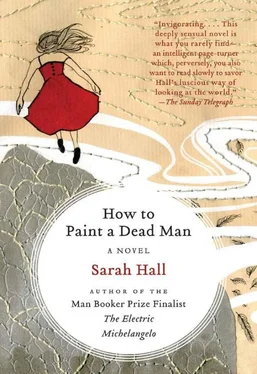Sarah Hall - How to Paint a Dead Man
Здесь есть возможность читать онлайн «Sarah Hall - How to Paint a Dead Man» весь текст электронной книги совершенно бесплатно (целиком полную версию без сокращений). В некоторых случаях можно слушать аудио, скачать через торрент в формате fb2 и присутствует краткое содержание. Год выпуска: 2009, Издательство: Harper Perennial, Жанр: Современная проза, на английском языке. Описание произведения, (предисловие) а так же отзывы посетителей доступны на портале библиотеки ЛибКат.
- Название:How to Paint a Dead Man
- Автор:
- Издательство:Harper Perennial
- Жанр:
- Год:2009
- ISBN:нет данных
- Рейтинг книги:4 / 5. Голосов: 1
-
Избранное:Добавить в избранное
- Отзывы:
-
Ваша оценка:
- 80
- 1
- 2
- 3
- 4
- 5
How to Paint a Dead Man: краткое содержание, описание и аннотация
Предлагаем к чтению аннотацию, описание, краткое содержание или предисловие (зависит от того, что написал сам автор книги «How to Paint a Dead Man»). Если вы не нашли необходимую информацию о книге — напишите в комментариях, мы постараемся отыскать её.
, Sarah Hall, "one of the most significant and exciting of Britain's young novelists" (
), delivers "a maddeningly enticing read... an amazing feat of literary engineering" (
).
How to Paint a Dead Man — читать онлайн бесплатно полную книгу (весь текст) целиком
Ниже представлен текст книги, разбитый по страницам. Система сохранения места последней прочитанной страницы, позволяет с удобством читать онлайн бесплатно книгу «How to Paint a Dead Man», без необходимости каждый раз заново искать на чём Вы остановились. Поставьте закладку, и сможете в любой момент перейти на страницу, на которой закончили чтение.
Интервал:
Закладка:
Pulling won’t work either. Even though it feels like the power in his arms and back is greater, still he can’t throw himself into it. The thing won’t budge. Each time he has tried the pain has returned, more and more inflamed. He will have to get comfortable, keep yelling, and hope someone comes. Darkness is flushing into the sky, like ink into water. What time is it? Time for everyone to be inside. The chances of discovery are slim really. A more susceptible mind might panic now. A weaker disposition might turn hysterical. He will have to centre himself, be Zen. He will have to meditate, or attempt to — he’s never actually tried before — and let his purified mind manage the situation. Lydia has described this state to him, and he has paid attention, sort of. A releasing of anxiety, a whitening, she says, then answers and forbearance arrive. How hard can it be?
So. Empty, empty, empty. What can he think about?
Such a bloody shame! The day started so well, what with the run, and the pretty light, and the feeling of contentment, and the kids both being home. And a good day’s work too, which is not always the case. He’s not always so ethical. Even removed from the conventional systems, he knows he must turn his hand to something useful, but too often does not. Often he is lazy. Often he procrastinates, distracts himself, and fiddles on, while a voice in his head tells him he is wasteful, he is wretched. Then he becomes desultory. He becomes blacker than obsidian — consumed by guilt and worthlessness. ‘Men should set to, as soon as they’ve digested their food’ was one of his father’s old adages. And ‘A good plumb line is the working mind’, whatever that one meant.
But there are days in the studio when he drinks nothing but homebrew and smokes too much pinch and can’t hold down a conversation about anything with his wife, and he is, well, the foulest git. She’s thrown him out before, and thrown a heel of bread into the lane after him, slamming the door like she wants the house to come down around her. It takes a lot, but lovely placid Lydia can be riled. Her inner banshee can be summoned. And then she is quite simply terrifying, and must be left alone to re-metamorphose. So he’ll spend the night on the fells. It isn’t purely punishment for the domestic malady. Lydia knows what will jolt him out of a filthy mood. She knows the tonic properties of spry grass under his backside and hedgerow foraging, the peating back over of campfires at sun-up. She knows him.
After the off-the-Richter-scale booming of the front door, he’ll rove about, huffing and coughing like a disgruntled ram, then he will light out into the hills. He’ll walk for hours, tossing away the bread in fury, and picking it up again. He’ll aim to get some height, altitudinally if not morally, then he’ll select a divot between granite slabs and chuck himself down.
Once settled, his mental torments are indulged fully. He will ruminate, tracking back through the years, revisiting other women, bad events, and disappointments, old arguments, while the sky passes grey-white overhead, and buzzards drift upwards on the aerial thermals. He will lament his lost talent, his pathetic life, and his unbearable lot. He will wonder why he should go on living. He will know, balls to bone, that a more miserable bastard than he there never was.
And then he’ll remember that he likes looking up. It reminds him of Lydia, when they first met, on her back in the fields of Lanercost Priory, facing an enormous teal dusk and the endlessness of space with such amity. She was clicking the number of bats departing the ruins with a thumb-counter. How lovely she was, with her halo of brown hair on the ground. How inspiring was her calmness.
Peter was aggravated that day. He was explosively angry, possibly only a few ventricle pumps away from premature coronary. A public arts meeting in the North-East he’d attended had dissolved into ridiculous back-tracking, funding had been pulled, his preliminary work for the project rendered useless. Doomed from the start, of course — art to fix a fucked-up town. A civic car-park mural — what a joke. He was offered his petrol money back, though he’d stormed out before recouping it. The commission was his first British endeavour after leaving America, and on top of all the other recent galactic failures it was simply too much.
The arterial route home was heaving with traffic, so he’d got off on to the old military road and gone into Roman ruin country. By Birdoswald his car was juddering, and at Banks the shredded tyre had started to slap the ground like a bested wrestler. When he got out to inspect it, he’d found the wheel rim stripped. He’d hoofed the car door, and begun to march ahead, furiously, hoping to hitch somewhere down the line, or catch the last train at Brampton, then stop over in Carlisle with a friend. But, given the supreme arsery of the day, he suspected he’d have to walk all the way.
It always surprised him whenever he saw the priory’s gothic frame, ruined and grizzled at one end, robust and functioning at the other, like a living thing that refused to die, even though its back end was already decomposing. The apple trees in the old quarter-garden were laden with big crisp globes — their branches were bowed over with fruit — and unholy fury had given him an appetite. There were a couple of cars parked outside by the massive stud door, the chance of a ride maybe, so he’d decided to investigate.
She was in a group of six voluntary bat watchers stationed around the monastery. She was lying not far away from the river and the heavy Cumbrian evening was balanced on the tip of her nose. Her brow was rippled, her eyes rolled up to the heavens. ‘Lie down,’ she’d suggested, and he’d dropped down next to her. ‘Two hundred and nineteen, or eighteen,’ she said. ‘They’re quick. Don’t confuse them with swifts. Here.’ She passed him the counter and let her elbow rest on his arm. Above — an incalculable, endless space, under which he’d felt microbial and strangely calm. He could smell the wild rhubarb down by the river, its red-and-green leaves tart and starchy, and the river itself. Click. ‘Two-twenty.’
Lydia. His marrow. His marra.
Is she starting to worry now, he wonders? Is this later than he usually gets home? Usual. But there is no usual. Unusual is usual where Peter Caldicutt is concerned. If he stays out all night, it isn’t a novelty; it doesn’t signify crisis or calamity, infidelity or abduction. He could be walking Helvellyn by moonlight with the Patterdale walking group. He could be sleeping it off on Donald’s couch, or hunting rabbits on the estate. She will simply expect to see him the next day, smoked and sooty from his bonfire, crow’s-feet stark white from squinting into the flames. She will expect to have to trim his beard where he has singed it by blowing too close to the embers, and they will laugh about the terrible smell — that awful tannic fume — which will remind them of the lacquered bouffants of the girls in school going up when they leant too close to the Bunsen flames. Remember those days?
Suddenly he can’t help thinking about the abattoirs. He worked there for a few months, ten years ago, when the outbreak happened. He never got used to watching the creatures react to the smell of their own kind being burned. The bulging of panicked eyes in the fleecy trailers. The plaintive bleating. The sudden mayhem that ensued, legs and horns breaking as the poor creatures tried to jump through the gaps in the trailer bars. He can’t help thinking about it now, here, with his leg held fast, and the incendiary pain licking up the muscle again.
When the light turns negative he can still see, but only in a loose, nocturnal way. The air around thickens. He is certain no one will hear him now when he shouts. ‘Heelloooo. Down heeeere. I’m huuurt,’ his voice booming in the stadium of the ravine. All the dogs are walked. Children are watching telly in bed, or sleeping. Someone might be out for a late-night romp in their car, but with the heavy breathing and the clambering between seats it is doubtful they will be paying attention to what’s outside in the dark. He will have to work himself free somehow, or be patient, stay put until dawn, and hope he is found. The madman’s curse, sleeping out under the stars-that’s what they used to say about the navvies-and though he has always loved it, he does not tonight. Tonight everything is wrong. The scree is silent, but within the silence the ground crackles and chimes, skitters and ticks. In the ravine, the wind is hawing between the channels of boulders, and there is the eerie percussion of little stones rolling over in supplication, like stag beetles under the moon. And he does not like this lonely quarry sonata at all.
Читать дальшеИнтервал:
Закладка:
Похожие книги на «How to Paint a Dead Man»
Представляем Вашему вниманию похожие книги на «How to Paint a Dead Man» списком для выбора. Мы отобрали схожую по названию и смыслу литературу в надежде предоставить читателям больше вариантов отыскать новые, интересные, ещё непрочитанные произведения.
Обсуждение, отзывы о книге «How to Paint a Dead Man» и просто собственные мнения читателей. Оставьте ваши комментарии, напишите, что Вы думаете о произведении, его смысле или главных героях. Укажите что конкретно понравилось, а что нет, и почему Вы так считаете.












